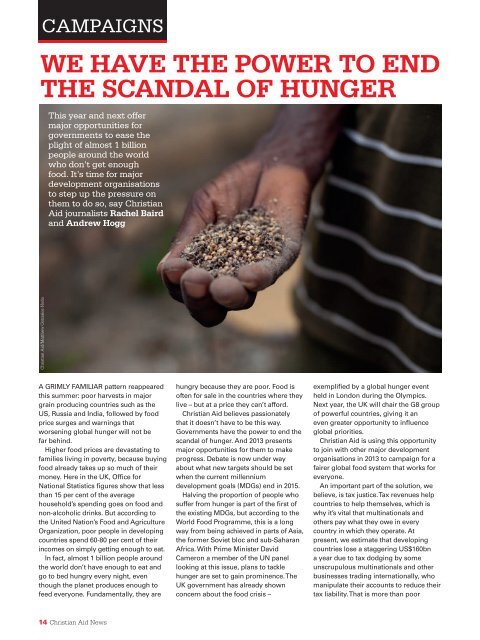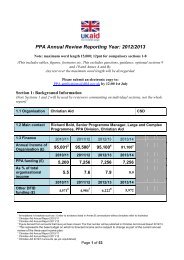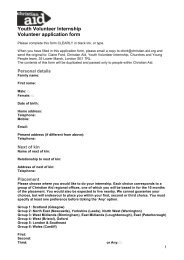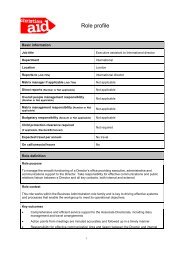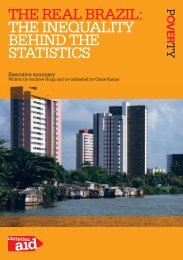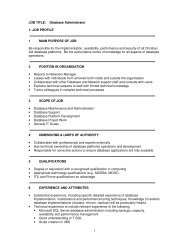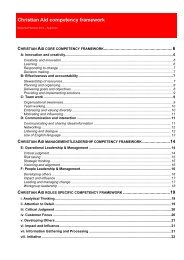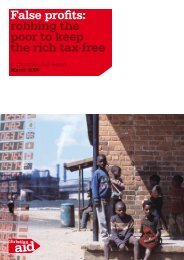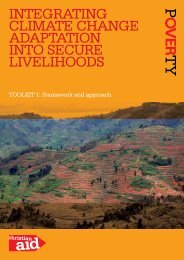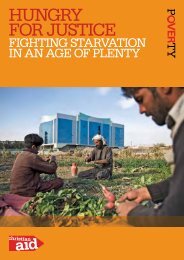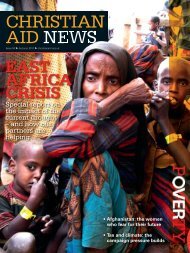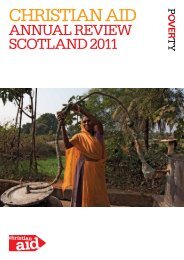CHRISTIAN AID NEWS
CHRISTIAN AID NEWS
CHRISTIAN AID NEWS
You also want an ePaper? Increase the reach of your titles
YUMPU automatically turns print PDFs into web optimized ePapers that Google loves.
CAMPAIGNS<br />
We have the poWer to end<br />
the scandal of hunger<br />
This year and next offer<br />
major opportunities for<br />
governments to ease the<br />
plight of almost 1 billion<br />
people around the world<br />
who don’t get enough<br />
food. It’s time for major<br />
development organisations<br />
to step up the pressure on<br />
them to do so, say Christian<br />
Aid journalists Rachel Baird<br />
and Andrew Hogg<br />
Christian Aid/Matthew Gonzalez-Noda<br />
A grimly fAmiliAr pattern reappeared<br />
this summer: poor harvests in major<br />
grain producing countries such as the<br />
US, russia and india, followed by food<br />
price surges and warnings that<br />
worsening global hunger will not be<br />
far behind.<br />
Higher food prices are devastating to<br />
families living in poverty, because buying<br />
food already takes up so much of their<br />
money. Here in the UK, Office for<br />
National Statistics figures show that less<br />
than 15 per cent of the average<br />
household’s spending goes on food and<br />
non-alcoholic drinks. But according to<br />
the United Nation’s food and Agriculture<br />
Organization, poor people in developing<br />
countries spend 60-80 per cent of their<br />
incomes on simply getting enough to eat.<br />
in fact, almost 1 billion people around<br />
the world don’t have enough to eat and<br />
go to bed hungry every night, even<br />
though the planet produces enough to<br />
feed everyone. fundamentally, they are<br />
hungry because they are poor. food is<br />
often for sale in the countries where they<br />
live – but at a price they can’t afford.<br />
Christian Aid believes passionately<br />
that it doesn’t have to be this way.<br />
governments have the power to end the<br />
scandal of hunger. And 2013 presents<br />
major opportunities for them to make<br />
progress. Debate is now under way<br />
about what new targets should be set<br />
when the current millennium<br />
development goals (mDgs) end in 2015.<br />
Halving the proportion of people who<br />
suffer from hunger is part of the first of<br />
the existing mDgs, but according to the<br />
World food Programme, this is a long<br />
way from being achieved in parts of Asia,<br />
the former Soviet bloc and sub-Saharan<br />
Africa. With Prime minister David<br />
Cameron a member of the UN panel<br />
looking at this issue, plans to tackle<br />
hunger are set to gain prominence. The<br />
UK government has already shown<br />
concern about the food crisis –<br />
exemplified by a global hunger event<br />
held in london during the Olympics.<br />
Next year, the UK will chair the g8 group<br />
of powerful countries, giving it an<br />
even greater opportunity to influence<br />
global priorities.<br />
Christian Aid is using this opportunity<br />
to join with other major development<br />
organisations in 2013 to campaign for a<br />
fairer global food system that works for<br />
everyone.<br />
An important part of the solution, we<br />
believe, is tax justice. Tax revenues help<br />
countries to help themselves, which is<br />
why it’s vital that multinationals and<br />
others pay what they owe in every<br />
country in which they operate. At<br />
present, we estimate that developing<br />
countries lose a staggering US$160bn<br />
a year due to tax dodging by some<br />
unscrupulous multinationals and other<br />
businesses trading internationally, who<br />
manipulate their accounts to reduce their<br />
tax liability. That is more than poor<br />
14 Christian Aid News


